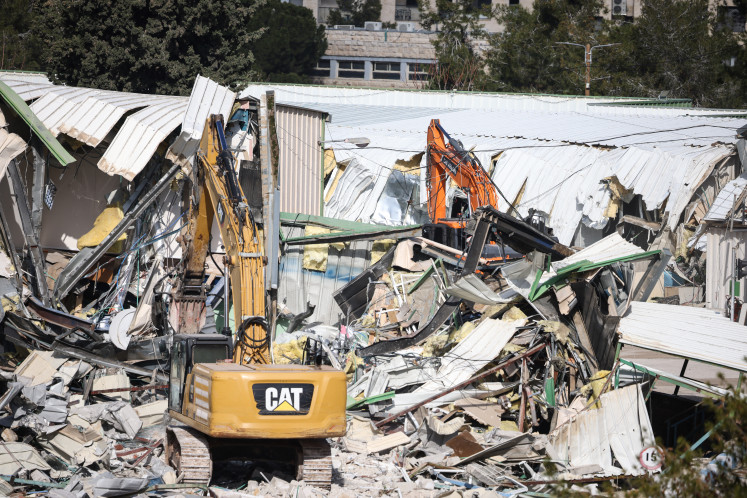Popular Reads
Top Results
Can't find what you're looking for?
View all search resultsPopular Reads
Top Results
Can't find what you're looking for?
View all search resultsTraining drills judges to avoid corruption
Long and winding road to justice: Three judge candidates walk around a fountain at the Supreme Court’s training and education facility last Friday in Bogor, West Java
Change text size
Gift Premium Articles
to Anyone
L
span class="caption" style="width: 398px;">Long and winding road to justice: Three judge candidates walk around a fountain at the Supreme Court’s training and education facility last Friday in Bogor, West Java. A candidate must pass a two-year training and internship program before they can be inaugurated as a judge. JP/Hasyim WidhiartoThe rain had just stopped on Friday afternoon when hundreds of judge candidates started to pack the auditorium of the Supreme Court’s training facility. They were about to attend the closing ceremony of their job orientation, which took place in the Puncak mountain resort area of Bogor, West Java.
Dressed in red and black, the young men and women showed their relief and happiness after completing the two-week program, designed to prepare them for the technicalities of court administration before departing for compulsory internships in local courts.
“I’m so happy because I will start my job soon,” said Erwan, a candidate from Kendari, Southeast Sulawesi, adding that he had been assigned an internship at the Cibinong District Court in Bogor regency.
Although he heard that most judges across the country had recently complained about their low salaries, Erwan said he was not worried.
“Being a judge is my own choice, so I have to be ready for its consequences, including receiving a limited salary and being posted anywhere, anytime,” he said.
Located 5 kilometers away from Puncak’s main road, the Supreme Court’s 6.5 hectare training facility is surrounded by farmlands and residences. Fifty meters from the entrance, a large fountain surrounded by potted flower plants warmly welcomes visitors.
Circling the fountain are an administration building, auditorium, mosque and dormitory building. Other facilities, like sport halls, classes, a health clinic, computer labs and a jogging track are on the other side of the compound.
Before being inaugurated as a full judge, a judge candidate must follow a long and tough training process, says the head of the Supreme Court’s training and education center for judiciary techniques, I Gusti Agung Sumanatha.
Under the current training program, candidates will be deployed to a number of district courts to intern as court administrators after completing the 2-week inaugural training.
After five months, the judge candidates return for a longer training program before starting their new internships as substitute registrars for the next six months. Finally the candidates will take up the role as assistant judges for another six months after completing final in-class training.
“Our decision to pass a judge candidate from the training program will not only rely on academic performance but also on discipline and performance during the internship,” Agung said, adding that all newly-inaugurated judges will be first posted outside Java.
Apart from providing judge candidates with vast knowledge of the Indonesian judiciary system and its practices, Agung said the two-year training program also focused on how to create judges who could withstand “the temptation of committing corruption while on duty.”
All candidates must attend “Emotional and Spiritual Quotient Way” motivational training (ESQ), which has become popular in the last few years, to instill the anti-corruption spirit and other values. They are also required to attend a special class on various possible corruption practices in the court, including bribery and gratification.
The candidates “not only learn about corruption practices from books but also how to respond to bribery attempts through simulation and role play,” said Agung, who has more than 20 years of experience as a judge.
During the New Order era, the selection of judge candidates used to be organized by the Supreme Court and Law Ministry, but now, according to the 2009 Law on Judiciary Powers, the selection is jointly held by the Supreme Court and the Judicial Commission.
Applicants for the judge candidate position must be between 25 and 40 years old and hold a law degree.
The Supreme Court’s research and development centre head Basuki Rekso Wibowo, however, said that recruitment would also strongly consider applicants’ “non-technical” abilities.
“Apart from meeting basic and technical requirements, a judge candidate must also have emotional
maturity, mental persistence and must be physically and mentally healthy,” said Basuki, also a law professor at Surabaya-based Airlangga University.
Basuki said the Supreme Court had also encouraged local universities to endorse their top graduates to join the recruitment process.
Dodik Setyo Wijayanto, a judge candidate from Cibinong District Court, admitted the high level of competitiveness of the recruitment process . A graduate of the University of Indonesia’s School of Law in 2006, Dodik said he had to retake the process twice before he finally passed it in 2009.
“Honestly, I felt a bit frustrated after being rejected from the recruitment process twice, because I thought I wasn’t any less intelligent than the other applicants. But thank God, I finally made it on the third attempt,” said Dodik, who completed the judge training program as one of its top graduates.
— JP/Hasyim Widhiarto










